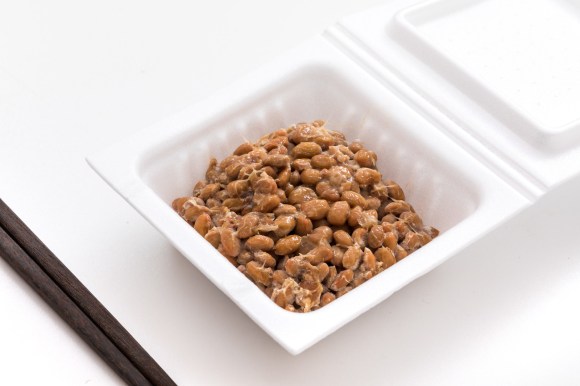
A popular snack for the trip home from Kansai is an Osaka-specialty pork bun, but some commuters think they should be banned.
The bullet train is one of the greatest feats of modern transportation technology, but as fast as it goes, it still takes a good two-and-a-half hours to get between Tokyo and Osaka. Chances are, you’re going to get hungry before you arrive at your destination, and while eating on ordinary commuter trains is generally frowned upon, it’s not uncommon for business people to pick up a snack or an eki-ben, a station-specialty lunch box, for longer rides.
But there’s some etiquette to consider when eating on the bullet train. First and foremost, eating cleanly and tidying up after yourself is a must, and not causing trouble to other guests with the sound of your food packaging is also important. Similarly, it’s also considered bad manners to eat something with a strong smell, since the aroma could bother other passengers. In a country that sells low-smell Kentucky Fried Chicken to discreetly carry on the train, politeness concerning food is key.
▼ For example, we really wouldn’t recommend eating Japan’s smelly fermented soy-beans on the bullet train.
For some bullet train passengers, however, it seems that calling it bad manners is not enough to discourage businessmen and women from eating fragrant foods. Instead, they are calling for a ban, especially of one particular target: the 551 Hourai Pork Bun, a steamed bun filled with spiced meat from Osaka, which is a local favorite and a popular train snack for commuters. These filling and tasty snacks have a meaty and sweet-salty smell, and are often eaten with Japanese spicy mustard, which adds to its pungent aroma.
▼ Presumably to most, it doesn’t smell bad; it probably just smells delicious.
https://www.instagram.com/p/BVGHzELBLix/
According to opponents, there are lots of reasons why it’s impolite to eat smelly food: it can make other passengers nauseous, it may disturb the sleep of your neighbors, and it might even make those who weren’t smart enough to pick up a snack before their departure hungry. But should the 551 Hourai Pork Bun be banned from the bullet train simply because it has a strong smell? Something that has an offensive smell, like fermented sushi, would be a bit more understandable. Who wants to smell, for example, someone’s girls’ feet-flavored fried chicken, when you’re going to be stuck with them and their smelly breath for two or more hours?
Some smelly foods have already been banned, like takoyaki, one of Osaka’s other famous cuisines made of octopus in fried balls of batter. It used to be the most popular bullet train snack, but owing to its distinctive smell, JR East initiated a rule in 2011 forbidding passengers to eat it. Other snacks and bentos sold at stations have stickers on them asking passengers to refrain from consuming them on the train, so it’s not unheard of for a particular food to be frowned upon.
Currently, however, JR East doesn’t have a policy on the 551 Hourai Pork Bun, and there’s no sticker requesting that passengers refrain from eating them. If someone makes a stink about it, train attendants may request that they put it away, but otherwise, at the moment, the 551 Hourai Pork Bun is a restriction-free food.
Will the voices against tasty train snacks be strong enough to force the 551 Hourai Pork Bun to meet the same fate as its predecessor? Only time will tell. But if so, supporters of the bun wonder where the line will be drawn. Will eating on the bullet train be banned altogether eventually? Let’s hope not, otherwise travelers may lose out on a lot of tasty food.
Source: Yahoo Japan News via Hachimakiko
Top Image: Pakutaso
Insert Image: Pakutaso (1, 2)



 Mr. Sato shares his genius method to have a pork bun on the Shinkansen and eat it too
Mr. Sato shares his genius method to have a pork bun on the Shinkansen and eat it too Japanese adult film actress covers herself in plastic, gives in to her urges on the Shinkansen
Japanese adult film actress covers herself in plastic, gives in to her urges on the Shinkansen The ultimate Shinkansen trip: Riding Japan’s bullet train network from one end to the other
The ultimate Shinkansen trip: Riding Japan’s bullet train network from one end to the other Evangelion Shinkansen gets range of souvenirs, including its very own bullet train ekiben obento
Evangelion Shinkansen gets range of souvenirs, including its very own bullet train ekiben obento Race against the clock: Shinkansen staff have just 7 minutes to get bullet train ready to ride
Race against the clock: Shinkansen staff have just 7 minutes to get bullet train ready to ride Japan’s cherry blossom season predicted to start earlier than we’d thought, especially in Tokyo
Japan’s cherry blossom season predicted to start earlier than we’d thought, especially in Tokyo Starbucks Japan unveils new sakura cherry blossom collection for hanami season 2026
Starbucks Japan unveils new sakura cherry blossom collection for hanami season 2026 One Piece creator has hidden secret of anime treasure’s identity in chest at bottom of real-world ocean
One Piece creator has hidden secret of anime treasure’s identity in chest at bottom of real-world ocean Japan’s Human Washing Machine pods are now on sale for home use, and they’re not cheap
Japan’s Human Washing Machine pods are now on sale for home use, and they’re not cheap Live-action One Piece’s Luffy teaches Sesame Street’s Elmo a Japanese word for friendship[Video]
Live-action One Piece’s Luffy teaches Sesame Street’s Elmo a Japanese word for friendship[Video] Taste-testing Japan’s real-world Dragon Balls and Senzu Beans at Marugame Seimen
Taste-testing Japan’s real-world Dragon Balls and Senzu Beans at Marugame Seimen Is Tokyo Station’s startlingly expensive wagyu bento boxed lunch worth its high price?[Taste test]
Is Tokyo Station’s startlingly expensive wagyu bento boxed lunch worth its high price?[Taste test] Kyoto raises hotel accommodation tax to fight overtourism, travelers could pay up to 10 times more
Kyoto raises hotel accommodation tax to fight overtourism, travelers could pay up to 10 times more One of Tokyo’s most famous meeting-spot landmarks is closing for good
One of Tokyo’s most famous meeting-spot landmarks is closing for good A look back on 40 years of Japanese schools banning stuff
A look back on 40 years of Japanese schools banning stuff Starbucks Japan releases first-ever Hinamatsuri Girls’ Day Frappuccino
Starbucks Japan releases first-ever Hinamatsuri Girls’ Day Frappuccino Japanese restaurant chain serves Dragon Ball donuts and Senzu Beans this spring
Japanese restaurant chain serves Dragon Ball donuts and Senzu Beans this spring Japan Extreme Budget Travel! A trip from Tokyo to Izumo for just 30,000 yen [Part 1]
Japan Extreme Budget Travel! A trip from Tokyo to Izumo for just 30,000 yen [Part 1] Japan’s craziest burger chain takes menchi katsu to new extreme levels
Japan’s craziest burger chain takes menchi katsu to new extreme levels Japan Extreme Budget Travel! A trip from Tokyo to Izumo for just 30,000 yen [Part 2]
Japan Extreme Budget Travel! A trip from Tokyo to Izumo for just 30,000 yen [Part 2] Japanese drugstore sells onigiri at pre-stupid era prices, but how do they compare to 7-Eleven?
Japanese drugstore sells onigiri at pre-stupid era prices, but how do they compare to 7-Eleven? Viral Japanese cheesecake from Osaka has a lesser known rival called Aunt Wanda
Viral Japanese cheesecake from Osaka has a lesser known rival called Aunt Wanda Lawson adds doughnuts to its convenience store sweets range, but are they good enough to go viral?
Lawson adds doughnuts to its convenience store sweets range, but are they good enough to go viral? Japan’s newest Shinkansen has no seats…or passengers [Video]
Japan’s newest Shinkansen has no seats…or passengers [Video] Starbucks Japan releases new sakura goods and drinkware for cherry blossom season 2026
Starbucks Japan releases new sakura goods and drinkware for cherry blossom season 2026 Foreigners accounting for over 80 percent of off-course skiers needing rescue in Japan’s Hokkaido
Foreigners accounting for over 80 percent of off-course skiers needing rescue in Japan’s Hokkaido Super-salty pizza sends six kids to the hospital in Japan, linguistics blamed
Super-salty pizza sends six kids to the hospital in Japan, linguistics blamed Starbucks Japan unveils new sakura Frappuccino for cherry blossom season 2026
Starbucks Japan unveils new sakura Frappuccino for cherry blossom season 2026 Foreign tourists in Japan will get free Shinkansen tickets to promote regional tourism
Foreign tourists in Japan will get free Shinkansen tickets to promote regional tourism The 10 most annoying things foreign tourists do on Japanese trains, according to locals
The 10 most annoying things foreign tourists do on Japanese trains, according to locals Take a trip to Japan’s Dododo Land, the most irritating place on Earth
Take a trip to Japan’s Dododo Land, the most irritating place on Earth Naruto and Converse team up for new line of shinobi sneakers[Photos]
Naruto and Converse team up for new line of shinobi sneakers[Photos] Survey asks foreign tourists what bothered them in Japan, more than half gave same answer
Survey asks foreign tourists what bothered them in Japan, more than half gave same answer Japan’s human washing machines will go on sale to general public, demos to be held in Tokyo
Japan’s human washing machines will go on sale to general public, demos to be held in Tokyo Starbucks Japan releases new drinkware and goods for Valentine’s Day
Starbucks Japan releases new drinkware and goods for Valentine’s Day We deeply regret going into this tunnel on our walk in the mountains of Japan
We deeply regret going into this tunnel on our walk in the mountains of Japan Studio Ghibli releases Kodama forest spirits from Princess Mononoke to light up your home
Studio Ghibli releases Kodama forest spirits from Princess Mononoke to light up your home Major Japanese hotel chain says reservations via overseas booking sites may not be valid
Major Japanese hotel chain says reservations via overseas booking sites may not be valid Put sesame oil in your coffee? Japanese maker says it’s the best way to start your day【Taste test】
Put sesame oil in your coffee? Japanese maker says it’s the best way to start your day【Taste test】 No more using real katana for tourism activities, Japan’s National Police Agency says
No more using real katana for tourism activities, Japan’s National Police Agency says Is it OK to play with Pokémon card on the Shinkansen? A bullet train manners debate
Is it OK to play with Pokémon card on the Shinkansen? A bullet train manners debate Tokaido Shinkansen ending in-train food/drink sales for all non-first-class-passenger cars
Tokaido Shinkansen ending in-train food/drink sales for all non-first-class-passenger cars A guide to riding the Shinkansen bullet train with a terrible-twos kid
A guide to riding the Shinkansen bullet train with a terrible-twos kid Cute ekiben station bento looks like it’s from Japan but it’s from a different place entirely
Cute ekiben station bento looks like it’s from Japan but it’s from a different place entirely